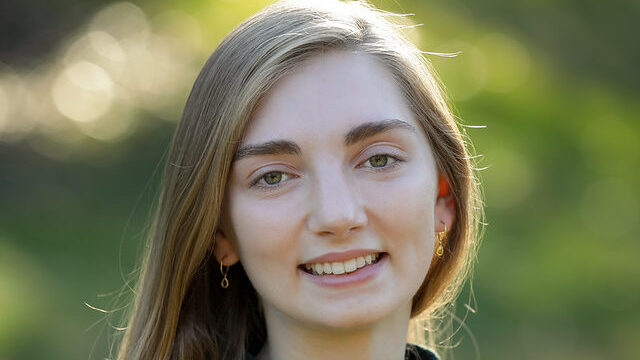Goldwater Recipient Focuses on Protein Research to Improve Disease Treatment
Lydia Good (C’21), a biochemistry major and mathematics minor, has been awarded the Barry Goldwater Scholarship, which she will use to continue her research in protein structure and function.
The prestigious national scholarship – given to students who excel in mathematics, engineering and the natural sciences – has been awarded to three other Georgetown College students over the past six years. They include Patrick Mulcahey (C’19), Ayan Mandal (C’18) and Sarah Waye (C’15).
“I am so honored and excited to have been selected as a 2020 scholar, and so thankful to everyone – especially my academic mentors and my parents – who have supported me over the years,” says Good. “I hope that this recognition of my research will afford me new opportunities to continue my training so that I can most effectively help people and advance scientific understanding through my work.”
Good plans to pursue a Ph.D. in biophysics and computational biochemistry after graduating from Georgetown to address questions of protein structure, function and design as an academic researcher in order to help other scientists develop tools to better understand diseases such as cancer, genetic diseases or viruses.
Working for Others
The rising senior spent her first, sophomore, and junior years working in Department of Chemistry professor Rodrigo Maillard’s lab, which focuses on intra-protein signal transduction mediated by allosteric interactions.
“Lydia provides a numerical and computational approach to study how proteins receive and pass along signals,” says Maillard. “The results from her work focused on Protein Kinase A, may open new opportunities for the development of novel therapeutics.”
Good’s work specifically looks at applying statistical tools to traditional biophysical analysis methods. Good started her research as a collaboration with Department of Mathematics and Statistics professor Mahlet Tadesse.
“These new approaches enable more robust and detailed descriptions of the processes of protein interactions from data collected using optical tweezers,” she says.
Summer Research
The Goldwater recipient also earned an opportunity with the Research Experience for Undergraduates Program with the Rosetta Commons, a group of academic labs studying protein structure prediction using the Rosetta macromolecular modeling, earlier this year. She is spending this summer examining a new area of protein research through a lab at the University of Copenhagen in Denmark online due to the COVID-19 pandemic.
Good’s research acumen has been recognized with numerous awards including the Clare Booth Luce Scholarship and Summer Fellowship, the Georgetown Undergraduate Research Opportunities Program (GUROP) Fellowship and the Baker Scholars Fellowship.
Enjoying Campus Life
When she is not in the lab, Good can be found dancing alongside her peers in the Georgetown University Dance Company, where she also works as the student artistic director. Good is also an energy and water conservation team member with Georgetown University GREEN.
This past season, she had the opportunity to choreograph her first original work for the company. Good says that dancing “not only helps me keep active and maintain balance in my life on campus, it engages a completely different but complementary side of my brain to my research.”
“It was a unique challenge that taught me not just about dance but about the process of reflecting, putting pieces and people together, and presenting work to a broader audience,” she continues. “I also value GUDC and GREEN for the amazing group of people from all sides of campus that I have met through these organizations, many of whom have become my closest friends at Georgetown.”
